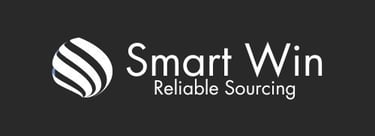10 Questions to Ask Before Partnering with a Chinese Manufacturer
10 critical questions to ask Chinese manufacturers to ensure quality, reliability, and successful partnerships for your sourcing needs
CHINA SOURCING
10/10/20246 min read


Sourcing products from China can provide your business with significant cost savings, scalability, and access to a wide variety of products. However, partnering with the right Chinese manufacturer is crucial to ensure product quality, reliability, and overall success. Asking the right questions before entering into a business relationship is key to mitigating risk, aligning expectations, and building a sustainable partnership.
In this article, we’ll explore 10 essential questions you should ask before partnering with a Chinese manufacturer, ensuring you make informed decisions that lead to long-term success.
Table of Content:
What is Your Company’s Background and Experience?
Can you send me your business document?
What Are Your Quality Control Processes?
Can You Provide Samples of Your Products?
What Are Your Minimum Order Quantities (MOQs)?
What is Your Production Lead Time?
How Do You Handle Product Customization?
Which markets and countries are you supplying?
What Are Your Payment Terms and Conditions?
How Do You Address Product Defects and Returns?
1. What is Your Company’s Background and Experience?
When considering a partnership with a manufacturer in China, it's essential to first evaluate their background and experience. The manufacturer's history will tell you a lot about their expertise, reliability, and ability to meet your business's needs.
Key Points to Address:
Years in Business: How long has the company been operating? A long-standing manufacturer is likely to have more refined processes and better quality control.
Product Focus: Does the manufacturer specialize in your specific product category? A manufacturer with expertise in your industry can often deliver higher quality products.
Client Portfolio: Who are their major clients? This can indicate the manufacturer’s credibility and market standing.
Export Experience: Ask about their experience exporting to international markets, especially your own country, to ensure they’re familiar with the necessary certifications and regulations.
2. Can You Send Me Your Business Documents?
Before entering into a formal partnership, it's critical to verify the manufacturer’s legitimacy by reviewing their business documents. A trustworthy manufacturer should be transparent and provide you with these documents upon request.
Documents to Request:
Business License: Ensures the manufacturer is legally registered and operating within China.
ISO Certifications: If applicable, this shows that the manufacturer follows international standards for quality management.
Factory Certifications: Look for specific certifications like CE, FDA, or RoHS that demonstrate compliance with regulations in your target market.
Verifying these documents helps you avoid partnering with fraudulent companies, ensuring your investment is protected.
3. What Are Your Quality Control Processes?
Quality control is one of the most critical aspects of product manufacturing. Before finalizing your partnership, ensure the manufacturer has a robust quality control process in place.
Important Considerations:
In-House vs. Third-Party Inspections: Does the manufacturer have internal quality control teams, or do they work with third-party inspectors?
Inspection Points: Ask if inspections occur during key stages of production, including pre-production, during production, and final pre-shipment checks.
Certifications: Are they ISO 9001 certified for quality management? This indicates a high level of commitment to quality.
You can also consider hiring a third-party inspection agency or a sourcing agent to independently verify product quality.
4. Can You Provide Samples of Your Products?
One of the best ways to evaluate a manufacturer’s product quality is by requesting samples before placing a large order. Sample testing can help you determine if the manufacturer can meet your specific standards and expectations.
What to Ask:
Sample Availability: Does the manufacturer provide samples, and what are the costs involved?
Customization: Can the samples be customized to match your specific requirements, including materials, dimensions, and branding?
Lead Time: How long will it take to produce and deliver the samples?
Quality Evaluation: Once you receive the samples, test them rigorously for durability, performance, and compliance with your market’s standards.
Always remember that receiving high-quality samples doesn’t guarantee consistent production quality, so combine this with a thorough quality control plan.
5. What Are Your Minimum Order Quantities (MOQs)?
Minimum order quantities (MOQs) dictate how much you need to purchase from the manufacturer in a single order. Understanding the manufacturer’s MOQ is crucial for inventory planning and budget management.
Points to Consider:
MOQ Levels: What is the standard MOQ, and can it be adjusted for smaller or first-time orders?
MOQ and Pricing: Often, manufacturers offer lower prices per unit for larger orders, so find out how the MOQ affects your cost structure.
Scalability: Is the manufacturer capable of scaling production as your business grows? Ensure their MOQ remains aligned with your capacity as you expand.
Finding a manufacturer whose MOQs align with your initial production needs is key to avoiding excess inventory or overspending.
6. What is Your Production Lead Time?
Production lead time is another critical factor that impacts your supply chain. It’s essential to know how long the manufacturer takes to produce your order and whether they can meet urgent or large-scale requests.
Considerations:
Standard Lead Time: How long does it typically take for the manufacturer to complete an order of your size?
Seasonal Variations: Be aware of Chinese national holidays, like Chinese New Year, which can delay production timelines significantly.
Rush Orders: Can the manufacturer expedite production in case of urgent orders? If so, what are the additional costs?
Capacity for Scaling: Ensure the manufacturer has the production capacity to accommodate increased order sizes as your business grows.
Clear communication about lead times will help you avoid delays in launching or restocking your products.
7. How Do You Handle Product Customization?
Many businesses require customized products to differentiate themselves in the market. Before partnering with a manufacturer, ensure they have the capability to handle your specific customization needs.
Customization Options:
Product Design: Can the manufacturer work with your design specifications or suggest improvements?
Packaging and Branding: Can they provide custom packaging that aligns with your brand’s identity?
Customization Costs: What are the costs associated with customization, and how do they affect the overall price and lead time?
MOQ for Customization: Some manufacturers may have higher MOQs for customized products. Clarify these requirements upfront.
Having a manufacturer that offers flexible and efficient customization services is essential for maintaining your brand’s identity and meeting market demands.
8. Which Markets and Countries Are You Supplying?
A manufacturer’s experience in supplying international markets can tell you a lot about their understanding of export regulations and product standards. Ask about the regions and markets they currently serve.
Key Insights:
Target Market Experience: Do they have experience exporting to your country or region? This ensures they’re familiar with your market’s regulatory standards.
Certifications: Ensure the manufacturer holds the necessary certifications for exporting to your country, such as FDA approval for the U.S. or CE marking for the EU.
Market Adaptability: How adaptable are they in meeting the specific needs of different markets, such as labeling, packaging, and legal compliance?
This question can help ensure a smooth import process and compliance with local regulations.
9. What Are Your Payment Terms and Conditions?
Before partnering with a manufacturer, it’s crucial to have a clear understanding of their payment terms. This will help you manage cash flow and minimize financial risks.
Important Details:
Payment Methods: What payment methods does the manufacturer accept? Common options include wire transfers, letters of credit, and escrow services.
Payment Milestones: Clarify whether the payment is split into milestones, such as a deposit, progress payments, and final balance upon delivery.
Currency Considerations: Understand the currency in which you’ll be paying and the potential impact of exchange rates on your budget.
Financial Protection: Consider using trade assurance or escrow services to protect your payments and mitigate risk.
Clear payment terms help build trust and ensure smooth financial transactions throughout the partnership.
10. How Do You Address Product Defects and Returns?
No matter how robust the quality control process, defects can still occur. It’s essential to know how the manufacturer handles defective products and returns to avoid costly disputes.
Questions to Ask:
Defect Reporting: What is the process for reporting product defects, and how quickly do they respond to such issues?
Product Replacements: Does the manufacturer offer replacements, and who covers the associated shipping costs?
Returns Policy: Is there a formal returns policy, and how are defective or non-compliant products handled?
Warranties and Guarantees: Does the manufacturer provide warranties on products? If so, what is the duration, and what is covered?
Having a clear understanding of how defects and returns are handled helps protect your investment and maintain customer satisfaction.
Conclusion: Partnering for Success
Partnering with a Chinese manufacturer offers immense opportunities for businesses looking to source high-quality, cost-effective products. However, success hinges on asking the right questions upfront. By addressing these 10 critical areas, you can ensure that your partnership is built on a solid foundation of trust, reliability, and mutual understanding.
About Smart Win
Smart Win is your trusted sourcing agent in China, with over 30 years of experience in helping businesses find reliable manufacturers. We specialize in supplier sourcing, price negotiation, quality inspection, and logistics management, ensuring a seamless experience from start to finish. Our team is committed to helping you find the perfect manufacturer to meet your needs while ensuring high-quality products at competitive prices.
Contact Smart Win today to start your sourcing journey with confidence.
Get in touch
Our Address
No.202 Huanshi West Rd, Yuexiu District Guangzhou, China
Contact Us
Working hours
Monday - Saturday
9:00 - 18:00
( Beijing Standard Time )
Smart Win Services


Company
